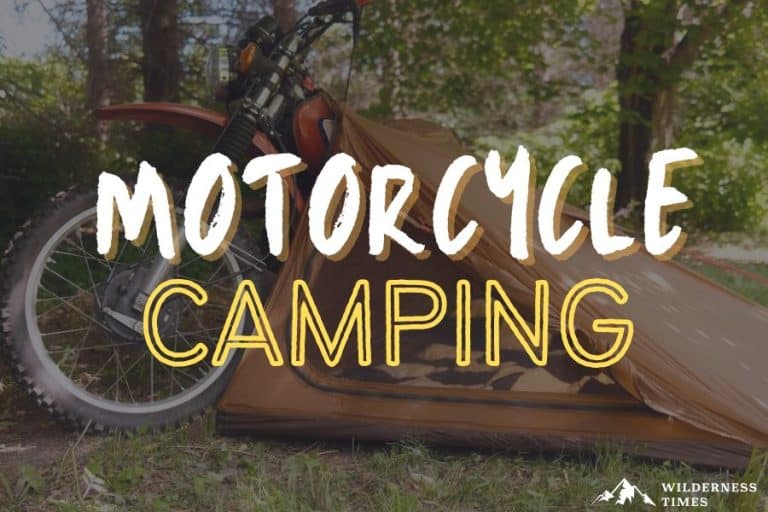Both riding a motorcycle and camping allow you to immerse in nature, which is why our guide to motorcycle camping is here to help you do just that.
So, putting the two together with motorcycle camping can really make for a unique and liberating experience.
But to make it work in practice, there are many things you need to consider.
And that’s why we’re here today.
From preparing your bike to packing your gear, we’ll cover all the tips for motorcycle camping you need for an enjoyable trip.
Without further ado, I present to you our complete guide to motorcycle camping. Let’s dive in!
Table of Contents
ToggleWhat Is Motorcycle Camping?

As the name suggests, motorcycle camping combines the use of motorcycles and the act of camping.
In a way, motorcycle camping is not much different from RV or car camping.
You’re traveling on wheels and spending the night in the wilderness.
You ride on your bike during the day, and you camp in your tent at night. That’s all there is to it!
In fact, the only real difference is that you’re not sleeping in your ride (obviously).
But here’s the thing – that single different factor does make this experience one-of-a-kind.
And to make it enjoyable and trouble-free, we’re going to cover some things you should keep in mind.
Also See: Different Types Of Camping – 13 Awesome Ways To Spend The Night In Nature
Considerations For Motorcycle Camping
Before you even hit the road on your ’cycle, there are many things to think about regarding your trip – just like any other camping adventure.
Trip Duration

So, the first thing you need to think about is how long do you plan on being on the trip?
The length matters because it determines what and how much you need to pack.
If you’re going on a weekend trip, then you won’t need many clothes.
A few sets to change depending on the weather will be sufficient.
But what if you’re away for a week, or longer?
Given that your storage space is limited on a motorcycle, bringing enough clothes for such a long trip means not having enough space for other essentials.
But since you’re on the wheels, then hitting the city and washing the clothes in a laundry service shouldn’t be too big of a hassle.
Of course, there are other things that are affected by the length of your trip. These include food, gas, your licenses, etc.
Motorcycle Weight Limit

Another thing to keep in mind is your motorcycle weight limit.
Overloading your motorcycle past that limit will put more strain on the tires, wheels, and even the frame.
Not to mention that your motorcycle will use more gas and might overheat from all the load.
Plus, you can even get fined for driving with an overloaded motorcycle!
Your motorcycle’s weight limit should be stated on the VIN plate.
Make sure to check that, as it can be much lower than you might think.
Also, don’t forget that the weight limit includes you and your passenger (if you have one).
Motorcycle Maintenance

The last thing you need is your motorcycle breaking down in the middle of nowhere.
And while some things can be unexpected, you can avoid most motorbike-related issues by keeping up with maintenance.
This includes some pretty obvious things, like making sure your tires are okay and your registration is up to date.
But one thing I recommend is visiting a mechanic for a quick check-up.
Of course, if you’re already experienced with doing repairs on your bike, you can do this yourself.
We’ll touch up on that later in the article.
Local Motorcycle Regulations

Custom modifying your bike means adjusting it to your needs.
But, that also means you might encounter legal issues regarding customization.
For instance, an after-market tuning device will make your motorcycle go faster, but also have an increased emission. This is illegal in many states.
So, before you hit the road, make sure your bike is in compliance with the regulations of the states you’ll be traveling through and staying in.
Appropriate Riding Gear For Different Weather

As you know, riding gear can be heavy and bulky. And given that you’re bringing your camping gear with you, you want to pack only the essentials.
That’s why it’s important to check the weather conditions prior to your trip.
If it’s going to be warm and sunny, a well-ventilated riding jacket will be sufficient.
However, if the temperature is around 60°F, you’ll need a windproof jacket.
The same goes for gloves. For summer weather, you need breathable gloves that will protect your hands in the case of a fall, but won’t make them sweaty.
For cooler weather, you’ll need something to keep your fingers warm.
The last thing you need is cold, stiff fingers that don’t operate the motorcycle that well.
While they’re not riding gear but motorcycle accessories, handguards can come quite handy in less-than-ideal weather.
They provide protection from debris and cold weather to your hands.
Regardless of the weather, a helmet is always a good idea.
Unless you’re traveling through New Hampshire, Illinois, and/or Iowa, a helmet is usually required by law.
Recommended Motorcycle Camping Gear Checklist
So, don’t know what to bring on your motorcycle camping trip? Here are the things we find essential for an enjoyable experience.
Sleeping Essentials

- Motorcycle Tent or Backpacking Tent
- Hammock (for an alternative shelter)
- Bivvy Bag (another alternative shelter)
- Sleeping Bag
- Sleeping Pad
- Tarp
Cooking Gear

- Camping Stove
- Cooking Kit
- Cutlery
- Camping Knife
- Can Opener
- Washbowl
- Firestarter
- Water Bladder
Clothing

- Helmet
- Motorcycle Jacket & Trousers
- Gloves
- Boots
- Ear Plugs
- Riding Socks
- Throw-Over Waterproofs
- Neck Scarf
- Down Jacket
- Shorts
- T-Shirts
Accessories

- Flashlight
- Camera or GoPro
- Memory Cards
- Chargers
- Satellite Messenger
- Sunscreen
- Bug Repellent
- Repair Kit
- Motorcycle Tool Kit
- Dirty Clothes Bag
Hygiene

- Microfiber Towel
- Biodegradable Soap
- Biodegradable Toothpaste
- Toothbrush
- Wet Wipes
- Shower Bag
- First Aid Kit
Check out our full Motorcycle Camping Checklist here.
How To Pack Your Bags For Motorcycle Camping
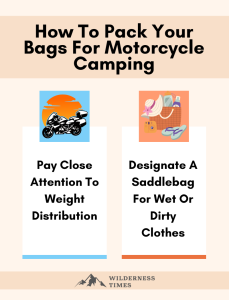
What makes motorcycle camping challenging is storage. Here’s how to make the best of it!
Pay Close Attention To Weight Distribution
You have a few options for storing your gear on a motorcycle, like a top box and panniers.
In fact, you should use them both for better storage organization.
Now, here’s the thing – what goes where matters.
What’s most important is to keep a low center of gravity.
This makes it easier for you to balance your bike, especially when you’re not in motion (like stopping at a red light) and using your foot to keep it stable.
So, how do we do that?
The heaviest stuff should be packed first. This will probably be your tent, stove, or cooking kit.
In any case, you want heavy items to go at the bottom of your panniers (saddlebags).
You noticed I said that in the plural – panniers? That’s because you don’t want to put all the heavy stuff into a single pannier.
Instead, you want to distribute the weight between two.
Then, you can place your lighter items on top of that.
In the case of essential (but light) things, like your camera or water bottle, they can go on the top.
Designate A Saddlebag For Wet Or Dirty Clothes
When you’re heading out, all your clothes are clean and folded. But throughout the trip, they will get wet or dirty.
Obviously, you don’t want to put them together with your clean clothes or gear.
So, this is when it’s time to do some reorganization.
Basically, you want to use one saddlebag for dirty and wet stuff.
But of course, you still need to make sure the weight is properly distributed on both sides of the bike.
You can add stuff like detergent or things you won’t use for the rest of the trip into the same saddlebag.
Having your stuff reorganized like that is a bit more work, but once you reach the laundry service, unloading is a piece of cake.
Tips For Packing Lighter
Packing lightly used to be my biggest struggle – for many years, I failed to bring only what was really important.
To make it easier for you, here are a few tips on the subject.
Only Bring What You Need

I know, it’s easier said than done. How does one know what they need?
Well, you know that you need a tent (or hammock/bivvy), a sleeping bag, and a pad.
These are the things you can’t really do without.
As for the rest of the gear, here’s a neat little trick: Imagine a day on the trip, from waking up to going to sleep.
What are the things you’ll surely need throughout the day? I’m sure stuff like a toothbrush, a stove, and a towel will come to mind.
Are any of those things available on the road?
For instance, you’ll definitely need water.
But you don’t need to pack 10 gallons for the entire trip when you can get water at a gas station or grocery store.
Research The Weather Ahead Of Time
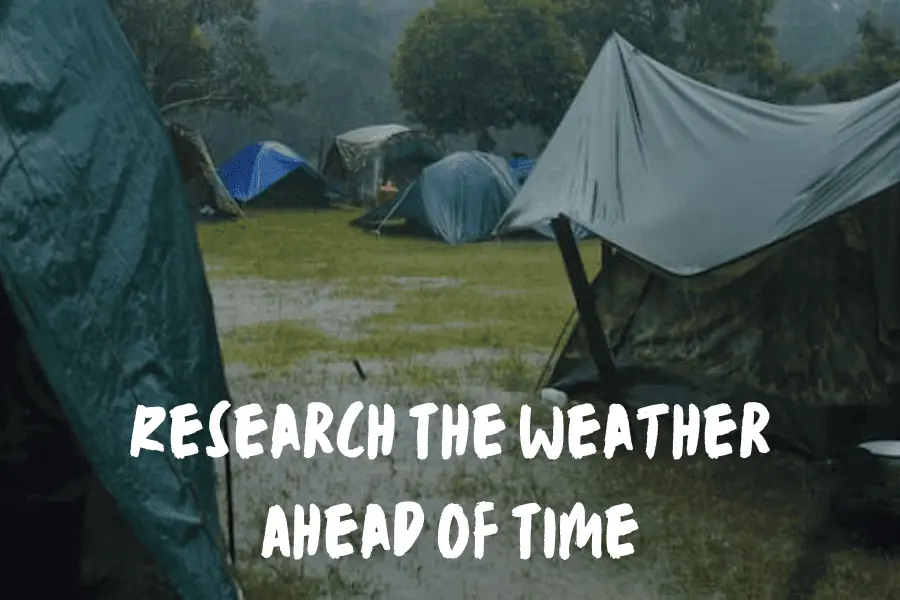
Dressing in layers is key to an enjoyable camping trip.
From dusk to dawn, temperature and weather conditions can change drastically, so you need to be prepared.
Depending on the climate, two days a week apart can experience completely different weather.
And rest assured, you don’t want to not be prepared for that.
But that doesn’t mean you should pack both summer and winter clothes, just in case.
After all, your storage space is quite limited, and it shouldn’t be filled with mostly clothes.
That’s why it’s important to research the weather prior to your trip.
That way, you can pack properly for the weather you’ll be experiencing.
Plan To Do Laundry

Unless you’re going on a two-day trip, you’ll surely have to wash your clothes on the road at a laundromat somewhere.
But where? Well, you don’t want to ask yourself that question once you’re already on the road.
Instead, do that prior to your trip.
If you’re staying at the campgrounds, a laundry facility might be available.
If not, you’ll need to find a laundry service in the area you’re in.
Luckily, a quick Internet search can get you all the information you need.
Get Lightweight Backpacking Cookware & Gear

Aside from your tent, your cookware might also weigh you down.
But that doesn’t have to be the case. With so many backpacking cooking kits, you can save up a lot on weight and storage space.
These kits are made of lightweight materials – typically aluminum – and pieces nest together in compact packaging.
That way, you have plenty of space for other essentials.
Motorcycle Camping Safety Tips
Staying safe while motorcycle camping is essential. Here are a few things to keep in mind.
Know Your Motorcycle

Never did any bike maintenance or fixing by yourself?
Well, if you have no experience fixing your bike, it’s time to learn.
When you’re out on the road, you might encounter issues that you don’t really need a mechanic to fix.
Or there may not be one within a good distance from you.
Changing a tire is one such example.
That’s a quick and easy procedure, but if you never tried it before, you’ll be spending unnecessary time figuring out how it’s done.
At the very least, what you can do at home is research how to change a tire on your motorcycle.
Furthermore, you should know how to check your oil, brake fluid, and tire pressure.
That way, if something feels off about the way your motorcycle is working, you can see where the problem might lie.
Invest In Quality Gear

This goes for both riding and camping gear.
While I’m all for saving up where it’s possible, having quality gear is definitely important.
Regarding riding gear, it has to be well-ventilated yet provide sufficient protection.
Plus, you don’t need me to tell you how important a quality helmet is.
As for camping gear, the tent, sleeping bag, and sleeping pad are your most important pieces.
When you’re camping during hot summer days, you might get away with a lower-quality tent and sleeping bag.
But in less-than-ideal weather, I definitely recommend investing in these three pieces of your camping gear.
Read: 10 Best Tents For Motorcycle Camping
Pack Essentials Only
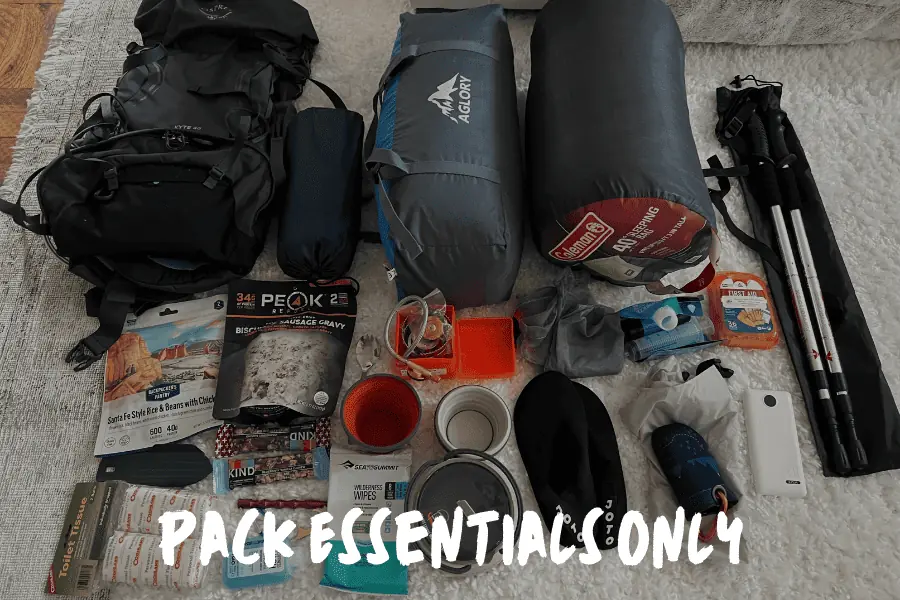
Aside from having limited storage space when you’re motorcycle camping, you also have a weight limit.
Going over that limit can put too much stress on your motorcycle, and even cause damage.
On the other hand, going light means driving with more ease and less gas.
Load Your Motorcycle Properly

Don’t just randomly throw things into your panniers.
Make sure the heaviest things are at the bottom and distributed between the two panniers for keeping the bike balanced.
Of course, keep in mind the things you might need while you’re on the road.
For instance, you don’t want to put your water bottle at the bottom of the bag, so you have to dig for it every time you want a sip.
Instead, place it in your top box for easier reach.
Choose A Good Campsite

Regardless of whether you’re motorcycle, car, or RV camping, one thing you want to make sure of is that you’ve chosen a good campsite.
Look for a spot that’s:
- Away from water to avoid insects
- Not on a used track
- Away from animal dens
- Not on low ground (to avoid flooding)
- Surrounded by trees for protection against the elements
I know, setting up a camp right next to a beautiful pond will give you amazing views. But, it will also bring mosquitoes…
Inspect Your Bike Before Parking

Check out your bike before parking it in a designated spot on your campsite.
Inspect the tires for possible leaks, as they’re much easier to fix while it’s still inflated.
You should also inspect the battery.
Cold weather can slowly drain the battery, so you want to make sure it’s sufficiently charged from the ride so that it doesn’t die.
Review Some Camping Basics

This one goes without saying. It’s especially important if you’re camping alone or with a group of first-time campers.
Since you have limited storage space, you need to figure out how to work with what you’ve got.
This goes from setting up the campsite to making food and dealing with hygiene.
Avoid Animals & Insects

It’s quite impressive how such tiny creatures like insects can make your trip a living hell.
But dealing with insects is something you can expect in the wilderness – at least during the warm season.
First things first, the best way to avoid a swarm of insects is to stay away from standing water.
This is where mosquitoes lay eggs and come to mate, and they won’t pass the opportunity to suck on your blood since you’re already there.
Luckily, there’s a huge range of insect-repellent products on the market, with DEET probably being a popular one.
As for other animals you might encounter on your trip, you should always keep your distance.
Generally, wildlife won’t approach you unless scared, protecting younglings, or hungry.
Mainly because of the last reason, it’s important to keep your food packed in containers or airtight bags.
Hanging your food from a tree might also be a good option.
If you’re camping in bear country, a bear-proof container is essential.
Tips For Enjoying Your Motorcycle Camping Trip
Overall, a motorcycle camping trip is quite a unique experience. Here are a few tips that can make it even more enjoyable.
Plan Your Itinerary Beforehand

I know, not having a plan does give a sense of adventure. But in most cases, you’re not making the best of your trip.
Now, I’m not saying you need to make a detailed plan of every single thing you’ll be doing in a specific order.
What’s the fun in that?
But, it’s always helpful to plan a travel route, including details like where you’ll take a break to get gas, eat, or enjoy roadside scenery.
While you don’t need to stick religiously to your plan, it helps you figure out how much time you have on your hands.
Of course, not everything works out as planned, and that might happen to you.
But with a plan in your mind, you can easily make adjustments where needed, and then carry on with your trip.
Take Frequent Scenic Breaks

As you know, riding a motorcycle is more demanding than driving a vehicle, both physically and mentally.
So, don’t push yourself trying to travel as much as you can in a single ride.
Instead, take frequent breaks.
To make those breaks even more enjoyable, do them at spots that have amazing views of the surrounding nature.
Rest assured that won’t be too hard. In fact, you might get encouraged to make even more such breaks throughout the ride.
Bring Entertainment Options

Whether you’re waiting for laundry to be done or a soup to get cooked, you might not have anything to do in the meantime.
Yes, it’s possible to get bored even when you’re out in the wilderness. Well, unless you pack some entertainment with you.
The great thing about having a ride is using it to charge your gadgets.
In such a case, I prefer bringing my Kindle rather than actual books, as I can save up so much space.
The same goes for listening to music. You can even bring a small stereo speaker!
Of course, bring whatever you enjoy the most – just make sure you can pack it!
Meet New People

Even if you’re going solo on this trip, that doesn’t mean you’ll be alone at all times.
You will definitely encounter other people at the campground, while getting gas or doing laundry.
In fact, you’ll probably get the chance to meet other motorcycle campers, doing the same thing you’re doing!
That’s a great opportunity to meet others with similar interests and expand your list of acquaintances.
Enjoy Outdoor Activities

This is the perfect opportunity to enjoy different outdoor activities.
From playing beach volleyball and badminton to kayaking and hiking, you can really do anything that comes to mind.
The fact that you’re on wheels means you can move fast from place to place, so you get to enjoy many different activities.
One day, you can be at the beach swimming, and the other you’re high in the mountains enjoying the views.
Stargaze At Night

If you live in an urban area, chances are you don’t really get to see the starry sky at night.
But that’s something you can enjoy on a camping trip!
If you have a double-walled tent, you can remove the rainfly on warm, clear nights and enjoy the view from your tent.
Prepare Delicious Meals

Who said that camping food is plain and boring?
With the necessary ingredients and a few tools at your disposal, you can make practically anything, from a casserole to pizza!
Even with a single pot at your disposal, you can still enjoy tons of different, delicious meals.
And trust me when I say you’ll remember those meals as an essential part of your trip.
Capture Trip Memories

While you’ll surely remember an enjoyable trip, having a photo memory is even better.
Rest assured a single look at those photos will bring you back to that time.
And that’s the best part about keeping memories, no?
Follow Local Laws

From driving to camping, you should be acquainted with the local laws of the areas you’re passing through.
This is especially important in terms of choosing a camping spot.
If you’re wild camping, make sure to check with local authorities where it’s possible to set up a campsite.
Relax & Have Fun!

I know, there are a lot of things to keep in mind when you’re motorcycle camping.
But don’t let all that get the best of you and not allow you to enjoy your trip.
After all, that’s the main purpose of it – to have fun. So, relax and make amazing memories.
Tips To Prepare Your Motorcycle For Camping
The last thing you need on your trip is your bike breaking down in the middle of nowhere.
But that can be avoided by doing proper preparation for such a trip.
Check Your Tire Pressure

This is something you should do whenever you’re hitting the road. Motorcycle camping is no different.
Make sure both tires are properly inflated. Furthermore, check for any signs of damage or regular wear and tear.
After all, tires are consumer goods, and they should be replaced after 5-6 years or so.
Test Your Brakes

Brakes are probably the most important part of any vehicle.
If they’re not on point, you don’t have complete control over your bike, which is extremely dangerous.
So, get down on your knees and have a good look inside your brake calipers.
Ideally, the layer of friction material needs to be thicker than the metal backing plate.
If they’re roughly the same, that’s not a reason to panic yet.
Your bike is still good to go, but make sure to do a checkup after your trip as well.
However, if the friction material is no more than a millimeter thick, then it’s time to replace your brake disks.
Clean The Air Filter

A dirty air filter will cause your bike to lose engine power.
Why is that?
Well, because all that dirt prevents oxygen from getting inside the engine. And that oxygen is needed for proper fuel burning.
Luckily, the filter is easily cleaned at home with a bit of soap and water.
Well, unless you have a paper filter, which you simply replace with another one of its kind.
In any case, this is a simple procedure that prolongs the life of your engine.
Change The Oil

Given that an oil change is cheap, this is something I’d recommend doing any time you’re going motorcycle camping.
While you’re there, you could also replace the oil filter.
This filter prevents grits and bits of engine wear from ending up in the system, which would inevitably damage it.
Charge The Battery

As you know, the battery charges while the bike is running.
But when you’re leaving for a camping trip, make sure your battery is completely charged.
This is especially important given that cold temperatures can drain the battery, leaving you stranded in the middle of nowhere.
Check The Lights

Not only you can get fined for not functioning lights, but that’s not a safe way to drive.
Before hitting the road, check all the lights:
- Headlights
- Taillights
- Turning signals
If any of them are flickering or dimming, that’s a clear cue they should be replaced.
To be safe, it’s always best to have replacement bulbs ready.
Add Storage Options

Your bike might come with a top box, but that’s not enough for a camping trip.
But getting two panniers allows you to pack so much stuff, without making your motorcycle look bulky and overpacked.
Tank bags are also great. They’re small, but perfect for storing documents, phones or whatever you might need close to hand.
Secure Loose Bolts & Screws

I still remember the day that one loose bolt left me stuck in the middle of nowhere, waiting for someone to pick me up.
Trust me, it’s a horrible experience.
I can’t state enough how important it is to check out every bolt and screw on your bike and ensure they’re secured in place.
Pack The Essentials

Finally, now that everything is ready, start packing!
But keep things simple. Bring only what you really need and can’t get on the road.
Why Motorcycle Camping Is Worth Trying
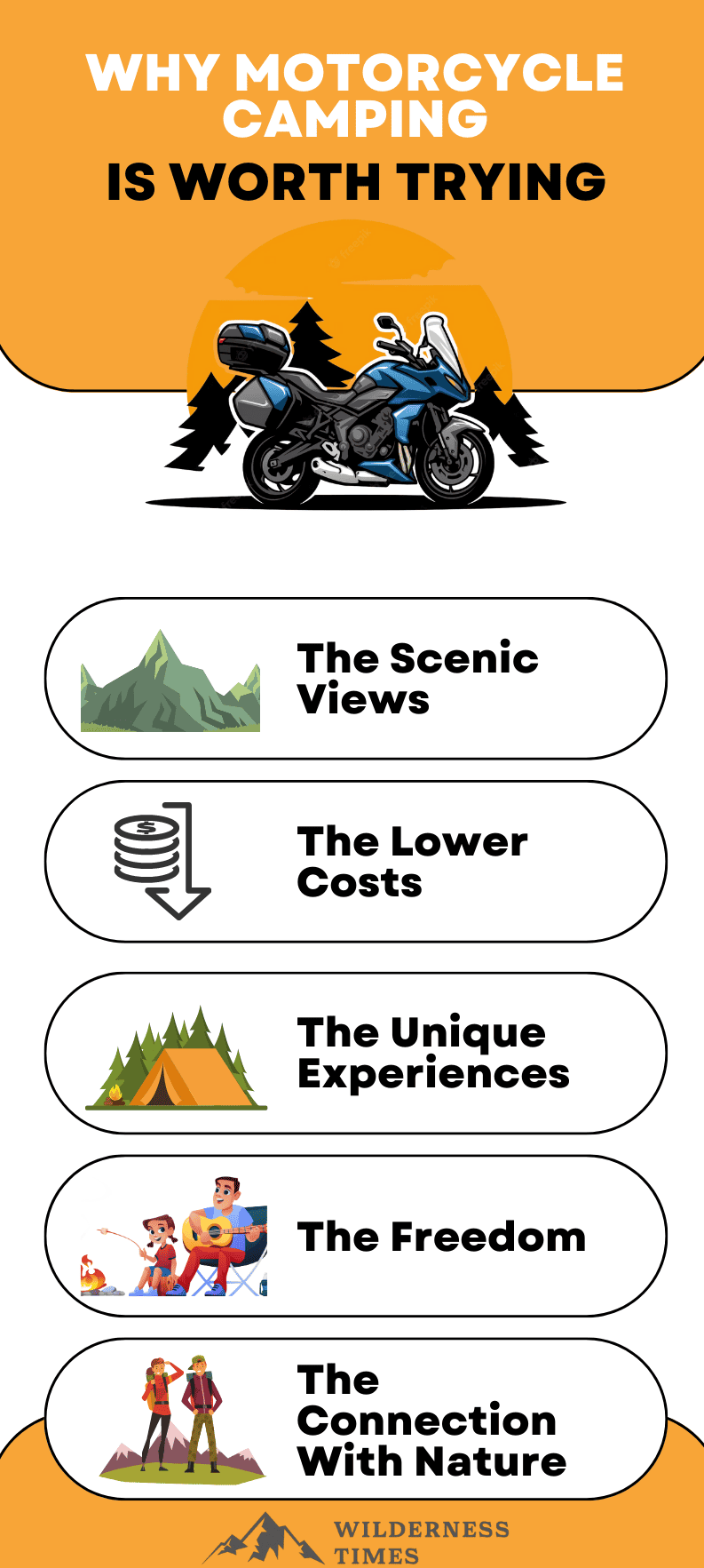
So, does motorcycle camping sound appealing? You might have your doubts, but I highly encourage you to try it! Here are a few reasons why:
The Scenic Views
First things first, the views!
When running errands or traveling from one place to another, you don’t always get to see all that nature offers.
But when you’re going camping, you choose your own routes and pass through more secluded places.
Wild scenery at its best!
The Lower Costs
In this case, gas is probably your biggest expense. Aside from that, you have everything packed to save up on travel costs.
Of course, you can choose what you’re saving on, be it accommodation, food or both!
But the point is, you can make this trip really affordable.
The Unique Experiences
This is really a unique way to experience camping.
Similarly to car or RV camping, you get to travel during the day and enjoy different camping spots at night.
But unlike the two, you’re completely immersed in nature.
The Freedom
The great thing about motorcycle camping is freedom.
First, you don’t have to think about parking spots as you do with a car or RV.
You’re not taking up too much spot, so as long as you’re not on muddy terrain, you’re fine.
What’s more, you’re traveling light so you can pause and set up a camp wherever you want (as long as it’s not illegal in that area).
The Connection With Nature
Finally, riding a bike leaves you completely exposed to weather elements.
You can feel the breeze, enjoy the sun rays and smell the scent of the surroundings.
In other words, you can feel really connected with nature and your inner self at that moment.
FAQs
Do I Need A Special License Or Permit To Camp With A Motorcycle?
No, you don’t. You only need to make sure that the location of your choice is suitable for parking a motorcycle.
How Much Does Motorcycle Camping Typically Cost?
Motorcycle camping is as affordable as you make it to be. Aside from gas, you don’t really need to spend money on anything else.
Instead, you can bring everything from home and save up.
What Are Some Recommended Routes Or Destinations For Motorcycle Camping?
Some of the most beautiful routes in the US are Route 100 in Vermont and Tail of the Dragon in North Carolina and Tennessee.
Both have amazing sceneries and campgrounds situated in the vicinity for those who aren’t wild camping.
Can I Camp With A Group Of Riders?
Of course, you can camp with as many riders as you want. It’s all about your preference and planning.
How Can I Cook While Motorcycle Camping?
Since you have limited storage space, consider making one pot or foil-packed meals.
That way, you don’t have to bring too many cookware pieces.
What Outdoor Activities Can I Do While Motorcycle Camping?
The great thing about motorcycle camping is you can enjoy any outdoor activity you want.
While you can’t bring much with you, you can always rent equipment for whatever activity you plan on doing.
How Do I Maintain My Motorcycle During A Camping Trip?
Always make sure your tires are fully inflated and the battery is charged.
You should also keep an eye on the gas, as you don’t want to run out of it while in the middle of nowhere.
To Sum Things Up
Motorcycle camping is an amazing experience that every bike owner should try.
Having a ride allows you to take joy in different surroundings during the same trip, while still enjoying a real camping experience.
Just take some of our tips from this ultimate guide to motorcycle camping into account, and you’ll have a blast!
More Camping Guides


